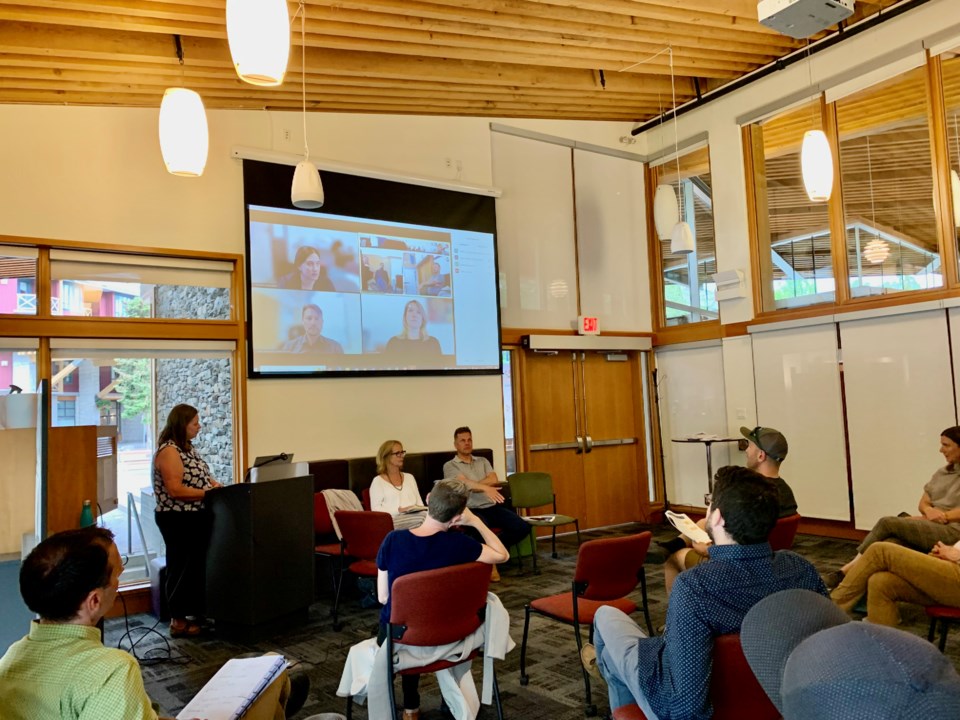Whistler’s 2022 municipal election campaign season is (unofficially) underway.
On June 28, Whistlerites interested in running for public office heard from a panel of former municipal politicians, school district representatives and Resort Municipality of Whistler staff who gave the lowdown on everything you need to know if you’re considering running for office.
The panel featured former Whistler Mayor Nancy Wilhelm-Morden, who served as a councillor for four terms between 1984 and 2008 and as mayor from 2011 to 2018, former Gibsons Councillor Jeremy Valeriote (2014 to 2018), School District 48 superintendent Chris Nicholson, and Whistler’s chief electoral officer Pauline Lysaght.
About 10 people came to the information session held online and at the Whistler Public Library. The crowd of potential future councillors, mayors and school board trustees could openly ask questions to the panel and staff.
The questions ranged from simpler ones like how many committees a councillor can be on, or what powers differentiate a mayor from a councillor, to more complex queries like if politicians are legally allowed to lie to the public. (The answer? They are, it's just not recommended.)
Whistlerites head to the polls on Saturday, Oct. 15.
So what should you know if you’re thinking about running for local office?
Well, for starters, you have to be 18 years or older on election day; be a Canadian citizen; have been a resident of B.C. for at least six months immediately before the day of registration; and not be disqualified under the Local Government Act.
One mayor, six councillors, and seven school board trustee positions are up for election this year. Two of the school board positions are earmarked for Whistler, with the remainder representing Squamish, Pemberton and two of the four electoral areas of the regional district.
There are no rules on residency to run in Whistler, so if you live in Pemberton, a Squamish-Lillooet Regional District (SLRD) area like WedgeWoods or Black Tusk, or even way out in Vancouver, you're still allowed to run in the Whistler municipal election.
Nomination packages will be available at municipal hall. All you need is two signatures from Whistler residents to be nominated. It would be best if you also had a financial agent in place, but candidates can represent themselves as such.
The nomination period is from August 30 to September 9. September 13 is the last day to challenge a candidate's nomination. The last day you can withdraw as a candidate is September 16.
The in-person voting day is October 15, with final results expected by October 24. Typically, council returns at the beginning of November.
Time commitment
The time commitment required for council ranges considerably, but staff surveyed each of the resort's current councillors and averaged out that it is between a 20- to 25-hour work week. Some councillors work substantially more than that.
With Whistler continuing to grow, the demands on councillors have also increased, with most councillors now viewing the position as full-time.
There is no limit to how many committees a councillor can be a part of or if they choose to answer calls from constituents after working hours, so the time commitment can range substantially.
The time commitment for school trustees is about four to six days a month. All municipal-level positions are for four-year terms.
If you win, what then?
Once you’re elected as a councillor, mayor or school board trustee, then what? Well, you get to start a new and exciting job and be part of the decision-making process for the community's future.
Former Mayor Wilhelm-Morden cautioned that things move slowly in the world of government, so while you might have lots of enthusiasm for change once you get elected, there is a bit of a learning curve, and things can take a long time to move forward.
“It is a little surprising just how long it took to get things done. On the one hand, it's a hugely rewarding job being on council because you can make decisions that impact the town right away, but it can also be frustrating because things take time. The process just grinds away sometimes," Wilhelm-Morden said.
“I know several people who, after one term, weren't interested in seeking reelection, because they wanted to get their hands off the wheel and get things done, and it could take more time. I used to tell my council that you can count on the first six months for not getting very much done because you're just trying to tailor the content, and the last six months of the term is not getting much done either, because politics keeps rearing its ugly head because there's an election coming up.”
When asked if she would do it again, Wilhelm-Morden cautioned that being mayor is not a job for those who can’t handle criticism from the public, but it is a highly rewarding position at the end of the day.
“It was one of the most rewarding things I've ever done,” she said. “Now, you have to be prepared. You're going to lose your privacy, and not just you, but your family members as well.
“You're going to be on the job pretty much all the time. You're going to be criticized publicly. You have to have thick skin and need some social media savvy. That's another whole different kettle of fish that I didn't have to deal with until the last couple of years of my second term."
Read more about Whistler's municipal election here.
To learn more about the school trustee election, you can find more information here.
So far, none of Whistler's current elected officials have publicly announced their intentions for the Oct. 15 vote.




